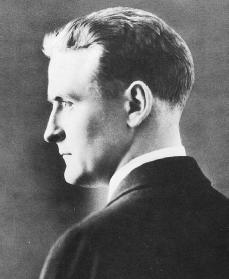 F. Scott Fitzgerald
F. Scott Fitzgerald "On May 10th, Baz Luhrmann's new film adaptation of F. Scott Fitzgerald’s literary masterpiece ``The Great Gatsby’’ hits theaters nationwide starring Leonardo DiCaprio, Tobey Maguire, Carey Mulligan, Joel Edgerton, Isla Fisher and Jason Clarke. The official premiere of the film kicked off at a star-studded event at Lincoln Center on Wednesday with a dazzling 3-D spectacle.
``The Great Gatsby’’, written by Fitzgerald while living with his wild and mentally unstable wife Zelda in France and Italy in 1924 and early 1925, tells the tragic story of Jay Gatsby (born James Gatz), once a poor young man who rose to become fabulously rich (through bootlegging) embraces a corrupted form of the American Dream by worshiping the monied class of Daisy Buchanan, a former flame of his while enlisted in World War I. Gatsby finally meets her again for the first time in five years and ultimately becomes destroyed by pursuing what he naively thinks will bring him happiness and fulfillment. The theme of disillusionment with American contemporary culture and its fraudulent emphasis on wealth and power are common threads found throughout the novel. But probably ``The Great Gatsby’s’’ most enduring impact was educating succeeding generations about the roaring 20’s, namely about jazz, gambling, excess drinking, and reckless living.
Whether the film meets with upbeat praise or is scorned by critics; the film will more than likely cause film goers to dust off ``The Great Gatsby’’ from their bookshelves or dash off to the library or their Kindle’s to reread what is now considered the Great American novel.
It’s shocking how long it took ``The Great Gatsby’’ to be considered a classic. It wasn’t until April 24, 1960, for example, that The New York Times wrote: ``It is probably safe now to say that it [The Great Gatsby] is a classic of twentieth-century American fiction.’’
Read the rest of this article HERE.
 RSS Feed
RSS Feed